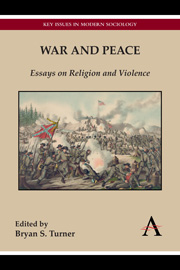Book contents
- Frontmatter
- Contents
- Acknowledgments
- Contributors
- Introduction by Bryan S. Turner
- War
- Chapter 1 Sacred Memory and the Secular World: The Poland Narratives
- Chapter 2 A Messianic Multiple: West Papua, July 1998
- Chapter 3 Lincoln, the Ministers of Religion and the American Jeremiad
- Chapter 4 Spiritual Violence: Max Weber and Norbert Elias on Religion and Civilization
- Peace
Chapter 3 - Lincoln, the Ministers of Religion and the American Jeremiad
from War
Published online by Cambridge University Press: 05 May 2013
- Frontmatter
- Contents
- Acknowledgments
- Contributors
- Introduction by Bryan S. Turner
- War
- Chapter 1 Sacred Memory and the Secular World: The Poland Narratives
- Chapter 2 A Messianic Multiple: West Papua, July 1998
- Chapter 3 Lincoln, the Ministers of Religion and the American Jeremiad
- Chapter 4 Spiritual Violence: Max Weber and Norbert Elias on Religion and Civilization
- Peace
Summary
Introduction: An Almost Chosen People
On 21 February 1861, president-elect Abraham Lincoln appeared before the New Jersey State Senate – after seven southern states had already seceded from the Union, and four more were preparing to follow suit – and described Americans in a curiously idiosyncratic manner:
I am exceedingly anxious that this Union, the Constitution, and the liberties of the people shall be perpetuated in accordance with the original idea for which that struggle was made, and I shall be most happy indeed if I shall be an humble instrument in the hands of the Almighty, and of this, his almost chosen people, for perpetuating the object of that great struggle. (Lincoln 1992a, 280; emphasis mine)
This was the only time Lincoln ever spoke of Americans as a “chosen people” – strange indeed for an orator already legendary for his unparalleled ability to frame political conflict in biblical terms. And yet he says Americans somehow were only “almost” chosen. In biblical terms, that is more or less like saying that Esau was “almost Jacob,” or Jonathan was “almost David.” Lincoln's ambiguity is especially puzzling during this era. As David Blight explains, by the 1850s a powerful conception of American “chosenness” became a “central unifying myth of nineteenth century America,” and had firmly entrenched itself in public discourse (Blight 1989, 104).
- Type
- Chapter
- Information
- War and PeaceEssays on Religion and Violence, pp. 63 - 78Publisher: Anthem PressPrint publication year: 2013

